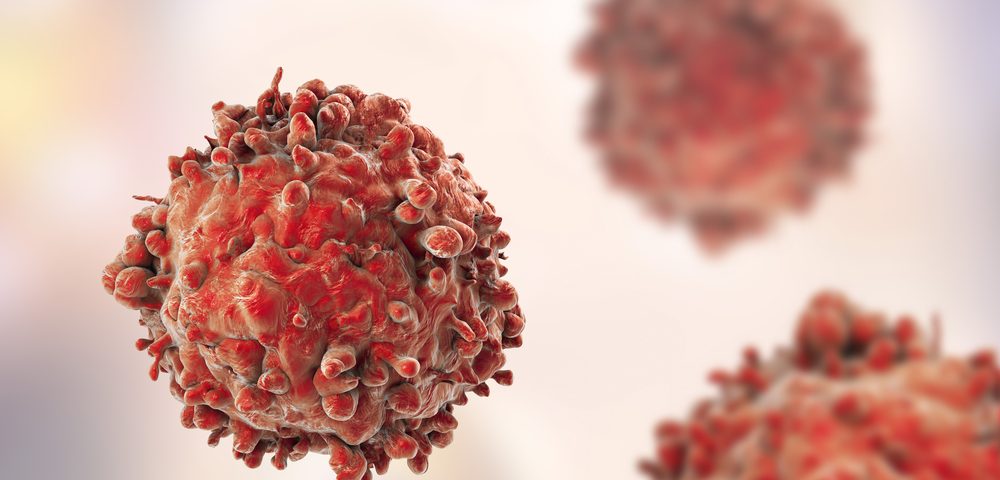Researchers have developed a potentially safer CAR T-cell product — one with a “safety switch” — that can be deactivated in the presence of specific molecules, a new study shows.
Temporarily “turning off” this product would allow for fine-tuning of immune cell activation when toxicity develops, the researchers said.
The study, “A computationally designed chimeric antigen receptor provides a small-molecule safety switch for T-cell therapy,” was published in Nature Biotechnology.
T-cells are immune cells that have the capacity to destroy cancer cells. Most cancer immunotherapies aim to improve the efficacy with which T-cells do this.
One such strategy is the use of chimeric antigen receptors (CARs). Basically, T-cells work by specifically recognizing a particular molecule, using a specialized protein receptor. When the receptor binds its target, the T-cells become activated to kill the cell expressing the molecule.
CARs are, in effect, a synthetic or lab-made version of the normal T-cell receptor, which have been designed to target a particular cancer molecule. For example, some kinds of lymphoma express high levels of the protein CD19, and T-cells with CARs specific to CD19 have shown efficacy in treating these tumors.
However, CAR T-cells can cause toxic side effects. By design, these cells induce a powerful inflammatory response, which can lead to cytokine release syndrome, a dangerous inflammatory condition caused by the large, rapid dispersal of immune substances called cytokines into the blood. Symptoms can range from fever and nausea to rapid heartbeat, low blood pressure, and trouble breathing.
Additionally, many “cancer molecules” aren’t actually specific to cancer cells. For instance, the protein prostate-specific membrane antigen (PSMA) is expressed by many prostate tumors, but also by cells in the gut and salivary glands. Thus, there is a concern that CAR T-cells could inadvertently attack healthy, non-cancerous tissues.
Because of these safety risks, there is a need for strategies to control CAR T-cell activity once the cells are delivered into the body of a person with cancer. Previously, this has been accomplished using a “suicide switch” — essentially, the cells are designed so that they’ll die when exposed to an otherwise non-toxic compound.
This strategy allows the therapy to be stopped in the event of an emergency. However, it has the obvious drawback that, once the suicide switch is activated, the CAR T-cells die, and any therapeutic response likewise is ended.
Now, the scientists set out to create a kind of CAR T-cell whose activity could be controlled in a more fine-tuned manner.
To do this, the researchers used computational modeling to create a new kind of CAR. In essence, conventional CARs have two main parts: there’s the part outside of the T-cell, which recognizes the target, and there’s the part inside the T-cell, which sends signals that make the T-cell become activated.
The new CAR, called a STOP-CAR, consists of two proteins, one with each of these functions. Under normal conditions, these proteins will interact with each other, functioning just like a normal CAR. But two specific small molecules, A1331852 and A1155463, can interfere with this interaction, uncoupling the two parts of the receptor. This turns off the CAR — and, by extension, the T-cell itself.
The researchers created STOP-CAR T-cells specifically for CD19 and PSMA. In dishes in the lab, these STOP-CAR T-cells were able to kill cancer cells expressing the respective cancer molecule with efficacy comparable with that of conventional CAR T-cells. But the STOP-CAR T-cells did not kill the cells when the specific small molecules — which acted as an “off switch” — were present. These results were further replicated in mice.
Importantly, in both dishes and mice, the STOP-CAR T-cells could be “turned back on” by the removal of the small molecule. This is a notable distinction from the “suicide switch” strategy.
“The real advantage of this system is that we can switch the T-cell back on again if we stop administering the molecule,” Bruno Correia, PhD, a professor at Ecole Polytechnique Fédérale de Lausanne, in Switzerland, and a study co-author, said in a press release.
“There’s no need to destroy the T-cells if they pose a threat to a patient’s health,” Correia said. “The system lets us precisely control the effects of immunotherapy.”
This new development also could be important for clinical trials of new CAR T-cells with unknown safety profiles, the researchers said.
Having such an “off switch” would allow any toxic effects that emerge during treatment to be controlled by simply “turning off” the CAR T-cells.
Of course, such applications are purely theoretical at this point. More research will be needed to fine-tune the system before it can be used in humans.
“In a broader context, our work demonstrates how rationally designed proteins can enable the use of clinically relevant drugs to control cellular processes,” the researchers said, adding that these finding may “critically contribute to enlarge the toolbox available to synthetic biology and cell engineering.”


